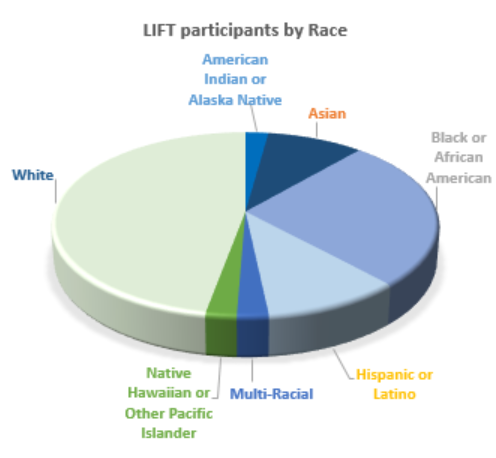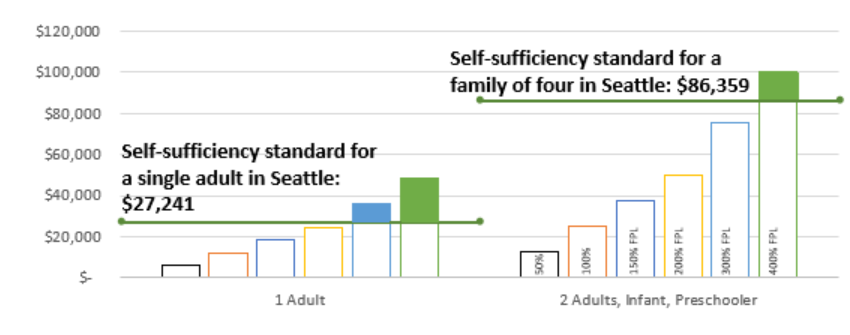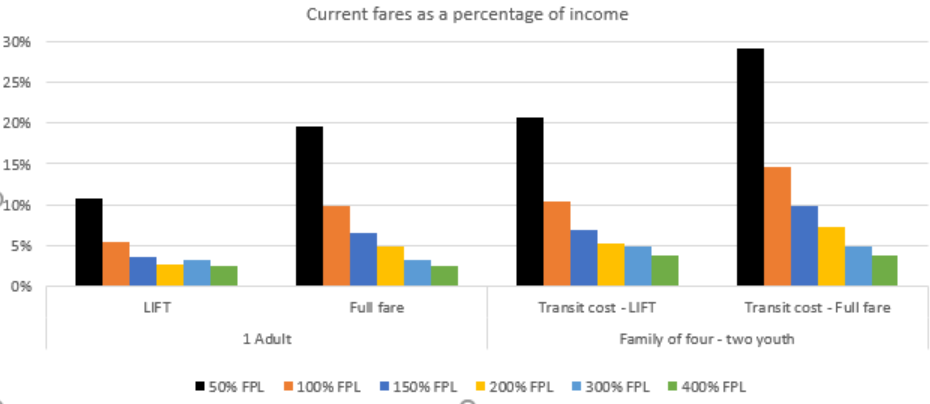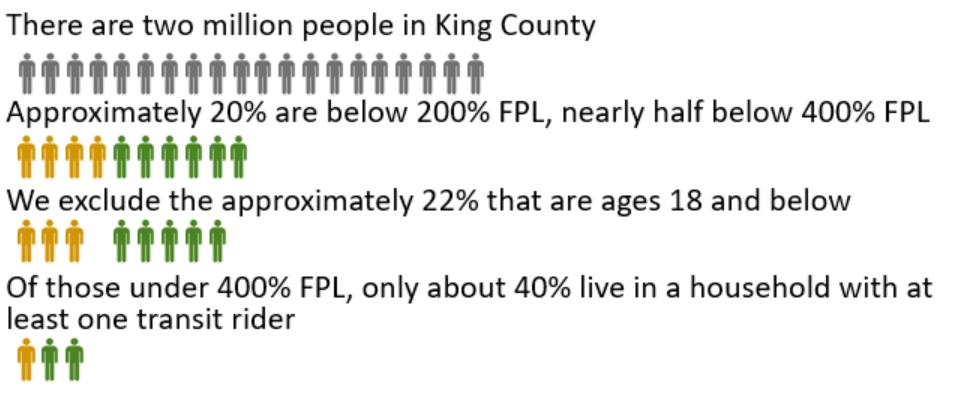Income-based fares
Income-based fares
As a provider of public transportation, it is imperative to assure mobility reaches everyone in a sustainable, healthy and equitable manner. At Metro we take this duty seriously, which is why we appreciate direction we received from King County Council last fall to continue our work to deliver on this statement by creating a new income-based fare program to make transit more affordable for those with the lowest incomes.
We are reaching out to your organization because we need your input and expertise to help us design the program to reach customers who cannot afford ORCA LIFT fares.
We are convening a group of stakeholders for three workshops in March, April and May of 2019 to provide input on the design and parameters of the income-based fare program.
In 2019, Metro will be developing a new income-based fare program to make transit more affordable for those with the lowest incomes.
-
This effort builds upon recent efforts to review and improve fares, including simplifying fares, developing youth pilot and promotional programs, and reviewing options for serving college students, residents of subsidized housing, low-wage workers, youth, and very-low income riders.
King County Council directed Metro to deliver an implementation report about the income-based fare program by September 2019 and implement the program by March 2020.
The income-based fares program must:
-
Adhere to Metro’s fund management policies, including maintaining a farebox recovery minimum of 25%
-
Have low barriers to enrollment
-
Be coordinated with human service provider agencies in order to streamline participants’ access to a range of income-based services
Metro's overall goals:
-
Everyone can afford to ride transit. Metro believes that the cost of transit should not be a barrier to use.
-
Everyone can get where they need to go, safely and easily.
The following survey is an opportunity for your organization to provide feedback on the materials and questions presented at workshop 1 on March 6. Your organization's feedback in this survey will be used to inform what program options Metro develops.
What does affordability mean in King County?
The cost of living in King County is very high. The Federal Poverty Level (FPL) threshold is set every year for the entire country and is used to measure poverty rates, including in the US Census information.
-
Currently this level is $20,780 for a family of four
The self-sufficiency standard looks at how much it actually costs in different areas and for different family compositions. It determines the amount of income required for working families to meet basic needs at a minimally adequate level that takes family composition, ages of children and geographic differences into account.
This chart shows a couple of things:
-
The cost of living is less affordable for families than for single adults
-
Only households at or above 400% of Federal Poverty, or $100,000 for family of four, would be able to meet the self-sufficiency standard. For single adults, those at or above 300% FPL would be able to meet the self-sufficiency standard
Based on this graph, we can see that those at the lowest poverty levels use the greatest percentage of their incomes on transit fares.
This explains the universe of people who are at or below 400% of the Federal Poverty Level.
These are Metro's current fare systems. Metro has offered low income fares to make bus service more affordable and accessible. This table shows the different fares for different needs, but we know that the fares are still too expensive for some, which is why we are here.
More detail about specific reduced-fare programs:
Human Service Ticket Program
-
Metro provided 1.6 million tickets to 168 number of agencies in 2018, for a total Metro subsidy of nearly $4 million.
-
Enough tickets to provide the 23,000 people who are currently homeless in King County with approximately 6 rides per month.
-
In 2018, agencies requested almost double as many tickets as are available under current code
-
Most agencies report primarily serving homeless population and report serving an estimated 100,000 individuals
ORCA LIFT is a low-income fare program intended for those at or under 200% of FPL
-
ORCA LIFT cards are intended for those at or under 200% of FPL. Cards are registered to an individual.
-
They can load an E-purse value on your card to pay for trips one at a time, or load a discounted monthly pass that lets you take unlimited trips for an entire month.
-
Individuals enroll at various locations – when they’re enrolling in other service programs (for example, Public Health enrolls individuals when they’re enrolling in health care)
-
45,000 LIFT cards are registered in King County
-
1,347,123 boardings on Metro in 4th quarter 2018 and now totals
-
6% of all boardings in October 2018
-
56% load value at ticket vending machines, only 15% online and 15% at retail locations
-
Most (80%) load E-purse, not pass products
-
About 43% load with cash, 37% with a credit card

-
Accepted on:
-
Metro Transit buses
-
Kitsap Transit buses
-
Sound Transit Link light rail
-
Sound Transit Regional Express buses
-
Sounder Trains
-
King County Water Taxi
-
Seattle Streetcar
-
Soon to come – Community Transit & Everett Transit
-
-
78% of LIFT-eligible households have access to at least one car, and 80% do not rely exclusively on Metro
-
LIFT-eligible households reported similar levels of satisfaction with other elements of fare payment as non-eligible households, including when asked about ease of paying fare when boarding, overall satisfaction with ORCA Card/U-Pass, ease of loading a pass or an ORCA card, or ease of adding value to E-Purse
What we still don't know:
-
How many people still find LIFT unaffordable?
-
Would non-riders take transit if the fare was lower?
-
What do non-riders do instead of taking transit? Do they use Human Service Tickets, ride without paying, forgo expenses for other basic needs, forgo trip-making, use less expensive modes of travel, etc.?
Other barriers we have heard:
-
Not having enough information or familiarity with the system
-
Challenge of riding with kids or special needs
-
Inconvenience associated with fare payment
-
Service span and reliability
The next workshop is on Friday, April 5 at Centilia Cultural Center (El Centro de la Raza on Beacon Hill, 1660 S Roberto Maestas Festival St., Seattle, WA 98144). Please proceed to step 2 and RSVP.
Please see the documents section above for the materials used during workshop 1:
-
PowerPoint
-
Parameters ranking handout
-
Agenda from workshop 1
-
Notes from workshop 1 (what we heard)
Contact the King County Metro Project Team directly:
Lindsey Greto, Income-based Fares Project Manager
- Lindsey.Greto@kingcounty.gov
- (206) 263-7886
Cindy Chen, Community Relations and Public Engagement Planner
- Cchen@kingcounty.gov
- 206-263-8952
DeAnna Martin, Partnerships and Engagement Manager
- DeAnna.Martin@kingcounty.gov
- (206) 477-3835



